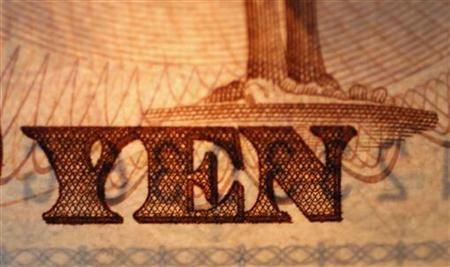Analysis: Japan's Costly Bid to Weaken Yen

Japan's costly attempt to weaken the yen underscores its determination to do its best to ease the pain felt by the export-reliant economy without embarking on a potentially thorny sustained yen-selling spree to turn the market's tide.
Vice Finance Minister Fumihiko Igarashi said Tokyo was not done intervening yet, signaling its readiness to step in again, after the authorities sold about 7.7 trillion yen ($99 billion), about double the previous record set on August 4.
Finance Minister Jun Azumi has also said dollar/yen levels around 76 and 77 were inappropriate, a sign authorities want the dollar to stay above 78 for as long as possible.
But Tokyo knows spending heavily day after day to defend a line in the sand would be unrealistic and would draw fire from its Group of Seven counterparts, concerned it could compromise the push for more flexible emerging markets rates.
Investors trading dollar/yen are more diverse now than when Japan last repeatedly sold its currency nearly a decade ago. The yen is also rising on factors beyond Tokyo's control, such as worries over Europe's debt woes, making it hard for authorities to influence the exchange rate in a sustained way.
The government, instead, will vary the size and timing to maximize the effect of any future intervention -- either in the form of another big bang or several rounds of action spending far smaller amounts, in the event of another yen rally.
The record size of intervention may have a symbolic meaning but what matters more is to step in at the best timing to catch speculators off guard, sources familiar with Japan's currency policy have said.
Sticky yen rises will continue as a trend, one of the sources said. There are many ways to make intervention work.
Policymakers know they would be fighting a losing battle trying to sustainably weaken the yen, which has drawn demand as a safe haven because of Europe's struggle to contain its debt crisis and doubts about the health of the U.S. economy.
They feel Japan cannot act like Switzerland, which has effectively pegged its currency to the euro pledging unlimited interventions, because its economy and the yen's trading volume are much bigger and harder to control.
But the government cannot afford to sit by while the yen rises to record highs, mostly for political reasons. Prime Minister Yoshihiko Noda, eager to mend ties with the business community, has faced mounting calls from exporters to address sharp rises in the yen that have hurt their revenues.
Calls for more action came even after Monday's intervention with a business lobby in the western Japan city of Osaka, home to big electronic makers like Panasonic Corp. (6752.T), urging the government to step in more frequently.
At current yen levels, overseas companies will take over key Japanese industries. Japan may sink as a result, Shinichi Otake, head of business lobby Kansai Association of Corporate Executives, told Bank of Japan Governor Masaaki Shirakawa at a gathering on Monday.
HELPING EXPORTERS KEY
Under such heat -- but wary of stepping in frequently for fear of angering its G7 partners -- Japan will try to hold off on intervention for as long as possible. But it won't hesitate spending heavily if needed to give exporters a chance to sell dollars at less painful levels.
The fact that two previous cases of unilateral intervention -- once in August and again on Monday -- occurred just after the 10 a.m. (0100 GMT) Tokyo fixing, when banks set their reference rate for customers for the day, shows how much authorities care about helping exporters.
It's natural for authorities to intervene shortly after Tokyo fixing, when trading is most active, so exporters can sell dollars at a good rate, said a trader at a Japanese bank.
Authorities have provided opportunities for exporters to sell the dollar and buy back the yen at more affordable levels to ease the pain the yen's gain has inflicted on their profits, said Makoto Noji, senior bond and currency strategist for SMBC Nikko Securities in Tokyo.
That is why authorities were seen selling the yen at 79.20 yen for hours.
Markets expect this practice to continue as exporters bear the brunt of the strong yen, meaning mid-morning in Tokyo could be the most likely timing if Japan were to act again.
Tokyo may also try other techniques to keep markets on guard, such as checking dollar/yen rates or bidding even during overseas hours to prevent speculators from using thin trading hours to test the yen's upside, traders say.
In case Japan needs to continue spending heavily, it will have little trouble to add to its war chest.
The government can raise the borrowing limit for intervention in a special foreign exchange account, reviewed each year by parliament when it compiles an annual budget.
Such practice is not new. It raised the limit for the second straight year in 2011/12 and aims to raise it again in a third extra budget set to pass parliament this month.
That had left 46 trillion yen available before Monday's intervention, more than the 35 trillion yen Japan spent in its record yen-selling spree in 2003-2004.
© Copyright Thomson Reuters {{Year}}. All rights reserved.






















